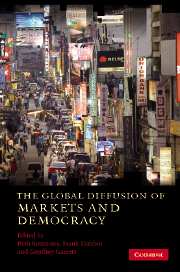
-
Select format
-
- Publisher:
- Cambridge University Press
- Publication date:
- August 2010
- March 2008
- ISBN:
- 9780511755941
- 9780521878890
- 9780521703925
- Dimensions:
- (228 x 152 mm)
- Weight & Pages:
- 0.726kg, 384 Pages
- Dimensions:
- (228 x 152 mm)
- Weight & Pages:
- 0.616kg, 384 Pages
- Subjects:
- Political Economy, Political Sociology, Politics and International Relations, Sociology
You may already have access via personal or institutional login- Subjects:
- Political Economy, Political Sociology, Politics and International Relations, Sociology
Book description
The diffusion of markets and democracy around the world was a defining feature of the late twentieth century. Many social scientists view this economic and political liberalization as the product of independent choices by national governments. This book argues that policy and political changes were influenced heavily by prior actions of external actors: not just other governments, but international organizations and communities of experts. Drawing together insights from economics, sociology, political science and international relations, the contributors focus on four mechanisms by which markets and democracy have diffused through interdependent decision-making: coercion and the impact of powerful countries and international actors; economic competition for markets and investment; learning from experiences of other countries; and emulation among countries. These mechanisms are tested empirically using sophisticated quantitative techniques in areas as diverse as capital account and investment policy, human rights and democratization, and government downsizing, privatization and taxation.
Reviews
‘Simmons, Dobbin and Garrett have put together a most impressive collection of studies of policy diffusion in world society. The chapters are sophisticated theoretically, and state-of-the-art methodologically and make a strong contribution toward a general analysis of global policy integration. They also contribute greatly to the study of the recent worldwide wave of liberal policies of political democratization and economic marketization.’
John W. Meyer - Stanford University
Contents
Metrics
Altmetric attention score
Full text views
Full text views help Loading metrics...
Loading metrics...
* Views captured on Cambridge Core between #date#. This data will be updated every 24 hours.
Usage data cannot currently be displayed.
Accessibility standard: Unknown
Why this information is here
This section outlines the accessibility features of this content - including support for screen readers, full keyboard navigation and high-contrast display options. This may not be relevant for you.
Accessibility Information
Accessibility compliance for the PDF of this book is currently unknown and may be updated in the future.


